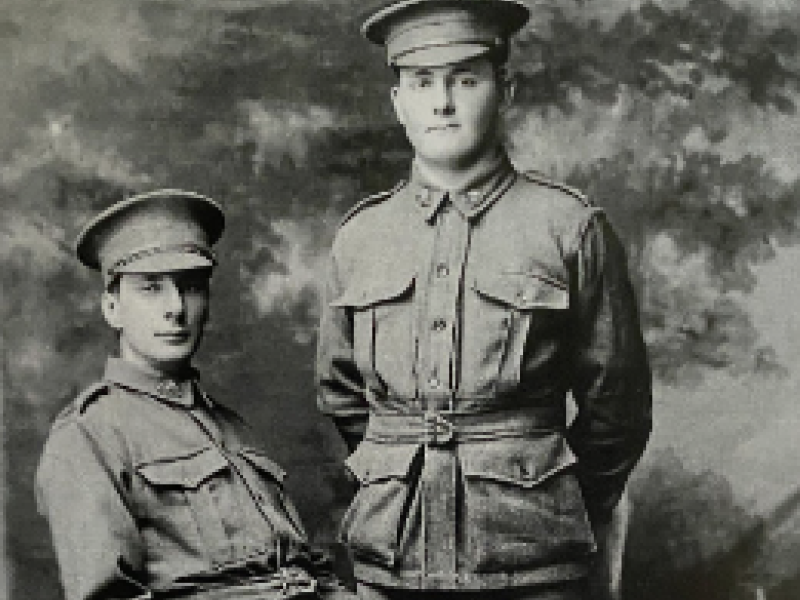Frederick (Fred) Summersgill Mitchell
Fred (sitting), and his twin brother Matthew, were born on the 3rd of August 1897 at Wodonga, Victoria. They were the eldest children of Braddon and Hannah Elizabeth (née Parnaby) and would eventually have four other siblings, three brothers and one sister. The family was a farming family, owning the property “Garden Vale” in the Bethanga area.
Fred enlisted in the 1st AIF with his twin brother, Matthew, on the day of their 18th birthday, the 3rd of August 1915. As both were underaged they needed a letter from their parents giving them permission to enlist. Fred was assigned the Regimental number 3541 whilst his brother was 3542. They enlisted at Melbourne and both were allocated to the 8th Reinforcements for the 24th Battalion. The 24th, along with the 21st, 22nd and 23rd Battalions, formed part of the 6th Brigade of the 2nd Division.
The 8th Reinforcements embarked on HMAT A19 Afric at Melbourne on the 5th of January 1916. On board were 1524 officers, sergeants and other ranks, destined for the Western Front. Afric had an average speed of 13 knots or just over 24 km/h. After arriving in Egypt, Fred was taken on strength with the 8th Battalion at Serapeum. On the 26th day of March he embarked on the Megantic and took passage to the Port of Marseille in the south of France.
On the 24th of June, 1916, the 8th Battalion moved into the Messines sector of the front line, relieving the 12th Battalion of the Royal Fusiliers. The position that the 8th occupied was overlooked by the enemy who occupied the high ground. This meant that any movement along the trenches was restricted to the hours of night. Between the 27th of June and the 1st of July the Germans heavily shelled the trenches resulting in 11 killed and 38 wounded.
The 8th Battalion war Diarist recorded the following for July the 1st.
“At 00:23 Gas discharged from Section on our right proceeded by artillery Bombardment and discharge of smoke bombs. Enemy retaliated with M.G. and artillery but ineffectively. Fairly quiet during day. Our artillery keeping up a continuous fire. Casualties 3 wounded.”
One of the wounded was Fred. He was hit in the left groin and stomach and admitted to the 7th Field Ambulance. Later that day he was transferred to the 8th Casualty Clearing Station where, unfortunately, he succumbed to his wounds. Clearly the German fire was effective for Frank.
He was buried in the Bailleul Communal Cemetery Extension, Nord Pas de Calais, France. He is also remembered on the Australian War Memorial Roll of Honour and the Bethanga Roll of Honour. For his service he was awarded the British War Medal and the Victory Medal

 Stephen Learmonth
Stephen Learmonth